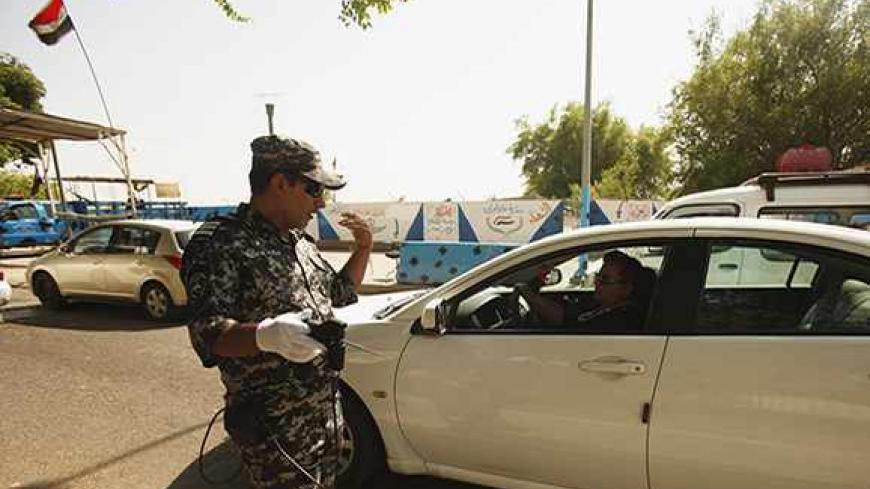In West Bank, Israeli army ramps ups WhatsApp surveillance of Palestinians
No sense of privacy remains in Israel's checkpoints in the West Bank, where civilians face increasing intrusions into their digital lives and social media apps.

RAMALLAH — Mohammad Ensawi, a young merchant from the West Bank village of Ebwein near Ramallah, had anticipated a timely return home for dinner on the evening of Dec. 25. After graduating with an accountanting degree from Birzeit University in 2020, Ensawi started a business selling plastics, cleaning supplies and detergents. His perception and pursuit of tranquility would be altered that Christmas Day on a curb while driving through Sinjil, where an Israeli military presence is unusual.
Ensawi recounted that as he made his way home through Sinjil, Israeli forces abruptly stopped him, flashing their lights, and asked him to turn off his vehicle and hand over his keys. Anticipating routine identification check in the occupied West Bank, he said, "I tried to hand over my ID card, but the soldier insisted on my phone rather than my ID.”
Forced to unlock the device, Ensawi was questioned about the presence of the Telegram application and then accused of attempting to delete it. “The soldier's scrutiny left me bewildered. I wondered how he had discovered my previous use of the application,” he said.
According to Ensawi, the soldier found a WhatsApp photo of a Palestinian killed by Israeli forces in Nablus months ago. The image had been posted in a group chat, and the soldier accused Ensawi of supporting terrorism before physically assaulting him.
He said the soldier threw him to the ground. “He sat on top of me, strangling and threatening me with a rifle in my mouth, saying 'Die, Die,'” said Ensawi.
Ensawi described how he pushed the soldier off him in desperation and was struck in the head with a rifle butt, leaving him bloodied.
“Then, a sudden intervention from another soldier, shouting for me to leave, ended the nightmarish episode,” he said.
Now he's thankful he survived the encounter and is haunted by the memory. "It's a stark reminder of the how brutal the occupation force can be. It’s as if they are taking revenge,” Ensawi concluded.
Heightened surveillance
Israel increased surveillance and imposed restrictions on Palestinians' freedom of speech and movement in the West Bank after Hamas' Oct. 7 attack on southern Israel. On Nov. 8, Israel enacted an amendment to its counter-terrorism law criminalizing the "consumption of terrorist materials," a new offense.
Rights experts caution that the legislation could facilitate unprecedented levels of surveillance.
Matt Mahmoudi, a researcher and adviser on artificial intelligence and human rights for Amnesty International in the United Kingdom, has highlighted how the use of AI-driven mass surveillance in the West Bank and east Jerusalem has been rising since the end of 2020. The extent to which it has increased since Oct. 7 is not yet known.
🚨 NEW REPORT 🚨 I'm finally able to share the results of an investigation started in the fall of 2021, exposing the use of facial recognition in key areas of the Occupied Palestinian Territories, to automate apartheid against Palestinians. @amnesty https://t.co/nZZV1CE70O pic.twitter.com/vtftkE5Rjx
— Dr Matt Mahmoudi @DocMattMoudi@mastodon.social (@DocMattMoudi) May 1, 2023
Mahmoudi argues that with the increased number of checkpoints, digital surveillance has also been on the rise. Mabat 2000 and Red Wolf are two mass surveillance systems that are deployed and utilized by Israeli security companies and the army for that purpose.
“Israel's systemic surveillance of Palestinians goes back the better part of a decade. The heightened surveillance system Mabat 2000 has been in place in east Jerusalem's Old City since 2000, and there is mass surveillance in the West Bank — especially in Hebron — since the installment of a system known as Red Wolf,” Mahmoudi told Al-Monitor.
He highlights how this is not a simple mass data collection system, because it takes a toll on individual safety and security. It uses facial recognition, labels individuals against mass data it is collecting and disincentivizes people from moving about and freely expressing themselves.
“Mass surveillance, in effect, is part of a coercive environment to force Palestinians out of their historic neighborhoods and shrink their spaces,” he said.
Mahmoudi contends that since Oct. 7, incidents similar to Ensawi’s experience have become routine, though the data is difficult to collect and cannot capture the full scale of AI's role in mass surveillance. He emphasizes the infringement on Palestinians' fundamental human rights.
His incident may not stop Ensawi from trying to reach all the areas of the West Bank, which has become rife with checkpoints, but it has surely stifled his freedom of expression and forced him to practice self-censorship.
“My phone is almost sterile [wiped clean],” he said.
More aggressive after Oct. 7
Residents of the West Bank have long been subject to various levels of surveillance, from interrogations at checkpoints to unannounced home raids. Extensive CCTV networks in Hebron and east Jerusalem, some collecting data inside private homes, continuously expose Palestinians to intrusive surveillance, according to legal experts and an Amnesty International report called "Automated Apartheid."
Amnesty's report, released in May 2023, highlighted the extensive use of facial recognition technology, such as Red Wolf at Hebron checkpoints and Blue Wolf, a smartphone app used by Israeli troops with a vast Palestinian database. Former Israeli soldiers described this surveillance to the rights group Breaking the Silence.
In several testimonies, they called it "Facebook for Palestinians" and said it's used not only for oppressive purposes but also as a testing ground for Israel's surveillance technology before global export.
The Blue Wolf app is like a game for soldiers, in which they get prizes for tracking people. It displays information about Palestinians from a massive database. Red Wolf, on the other hand, scans people's faces at checkpoints without their knowledge and adds their pictures to a database. If someone is not in the database or is wanted by the authorities, they might not be allowed to go through.
One taxi driver, who wished to be identified only as A. A., from a village between Ramallah and Jerusalem has noticed a concerning shift in attitude at the military checkpoint since Oct. 7.
“Since the war, soldiers have grown more aggressive. All they are concerned with is seizing and inspecting mobile phones rather than identity checks,” he said. “This change has led many travelers to delete personal content from their devices pre-emptively.”
The checkpoint — never a routine stop — has transformed into a space where privacy is compromised as individuals grapple with intrusions into their digital lives.
Also in May of last year, an article titled "The Technology of Occupation Has Become One of Israel's Main Exports" by Antony Loewenstein and published by the US-based nonprofit organization Democracy for the Arab World, warned that the intensified surveillance and invasive scrutiny of personal devices at Israeli military checkpoints raises concerns about the violation of privacy rights protected under international humanitarian law as well as breaches of the principles of humane treatment and the prohibition on violence against individuals, particularly civilians.
Moreover, the article argues that the militarization of social media — exemplified by the Israeli military's information war strategy, which involves intimidation, searches at checkpoints and facial screenings targeting noncombatants and ordinary civilians during operations like Pillar of Defense in 2012 — suggests a complex blend of propaganda and potential manipulation of public opinion, raising questions about the ethical use of technology during armed conflicts.
These studies collectively point to a broader problem of tools and strategies being developed and tested in the Israeli-Palestinian arena and then exported and employed globally, potentially perpetuating legal violations in other contexts. While all eyes are on Gaza, Palestinians in the West Bank are helpless to defend themselves against it.
Subscribe for unlimited access
All news, events, memos, reports, and analysis, and access all 10 of our newsletters. Learn more
Continue reading this article for free
Access 1 free article per month when you sign up. Learn more.
By signing up, you agree to Al-Monitor’s Terms and Conditions and Privacy Policy. Already have an account? Log in








